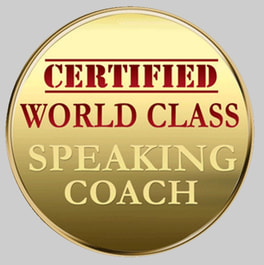
When I began to coach business people in search of public speaking success I came across an intriguing belief shared by virtually all my clients. One particularly bright and engaging client in her mid-forties, let’s call her Susan, came to me for private coaching hoping she would overcome the crippling anxieties she felt presenting to her bosses in the boardroom. As I do before any session, I asked Susan what she hoped to achieve from our time together.
"I want to hold my nerve and stop freaking out when I'm speaking to my bosses", she said, "But I’m realistic. I know I'm not a good speaker and I never will be so I'm not looking to be Mary Robinson. I just want to get through my presentations without losing the plot."
“How do you know you will never be a good speaker?" I asked, surprised at her sentiment.
"Well… maybe a good one", she said, "But not a great one. My brother Kevin... he can talk for Ireland. He's a natural. I'm not blessed with this particular skill. But you can help me with my fear, right?"
I've lost count of the number of people who said to me something to the effect of; “I will never be as good as X, Y or Z” and "I don't think I'm a natural." It's amazing how many people believe that public speaking is something that some people "just have" and others… well… just don't. This begs the question: is the ability to speak in front of an audience something you are born with? Is it genetic?
Six years ago I witnessed 2001 World Champion of Public Speaking Darren LaCroix tell an audience of fearful hopefuls; "Public speaking is a process, and like any process anyone can master it." Darren went on to explain how one day long ago he decided he wanted to become a comedian, much to the chagrin of his family. When he first attempted to perform stand-up comedy in front of an audience the results were, shall we say in a polite way, clunky?
Darren delights in sharing an early roughly-shot video of him desperately trying to spit out one-liners to an audience ready to wage war with rotten tomatoes. By the way, if you want to feel the full-throttle of an onslaught of nerves, try performing a stand-up comedy routine. It puts business presentations into perspective.
Months after his ill-fated experience, Darren embarked on a mission to gain a lasting confidence speaking in front of groups of people. In short, he ended up becoming world champion. During his journey he developed a system to help him to master public speaking. That is why Darren refers to public speaking as a process. I would go further for clarity and say it is a learned process…
In our everyday lives we are surrounded by learned processes – riding a bicycle, driving a car, playing a musical instrument, swimming, threading a needle… you name it. None of us are born with these abilities. Learned processes can be complex, and you may argue that there are levels beyond mere adequacy - levels of true mastery, perhaps. For example, you may learn to drive a car but you might never have the opportunity to become a Formula One champion.
"I want to hold my nerve and stop freaking out when I'm speaking to my bosses", she said, "But I’m realistic. I know I'm not a good speaker and I never will be so I'm not looking to be Mary Robinson. I just want to get through my presentations without losing the plot."
“How do you know you will never be a good speaker?" I asked, surprised at her sentiment.
"Well… maybe a good one", she said, "But not a great one. My brother Kevin... he can talk for Ireland. He's a natural. I'm not blessed with this particular skill. But you can help me with my fear, right?"
I've lost count of the number of people who said to me something to the effect of; “I will never be as good as X, Y or Z” and "I don't think I'm a natural." It's amazing how many people believe that public speaking is something that some people "just have" and others… well… just don't. This begs the question: is the ability to speak in front of an audience something you are born with? Is it genetic?
Six years ago I witnessed 2001 World Champion of Public Speaking Darren LaCroix tell an audience of fearful hopefuls; "Public speaking is a process, and like any process anyone can master it." Darren went on to explain how one day long ago he decided he wanted to become a comedian, much to the chagrin of his family. When he first attempted to perform stand-up comedy in front of an audience the results were, shall we say in a polite way, clunky?
Darren delights in sharing an early roughly-shot video of him desperately trying to spit out one-liners to an audience ready to wage war with rotten tomatoes. By the way, if you want to feel the full-throttle of an onslaught of nerves, try performing a stand-up comedy routine. It puts business presentations into perspective.
Months after his ill-fated experience, Darren embarked on a mission to gain a lasting confidence speaking in front of groups of people. In short, he ended up becoming world champion. During his journey he developed a system to help him to master public speaking. That is why Darren refers to public speaking as a process. I would go further for clarity and say it is a learned process…
In our everyday lives we are surrounded by learned processes – riding a bicycle, driving a car, playing a musical instrument, swimming, threading a needle… you name it. None of us are born with these abilities. Learned processes can be complex, and you may argue that there are levels beyond mere adequacy - levels of true mastery, perhaps. For example, you may learn to drive a car but you might never have the opportunity to become a Formula One champion.

Here’s the good news… there is a relatively easy and universally accessible route to a level of true mastery when it comes to public speaking. All it takes is having the right system for success, and a good old-fashioned belief in yourself. And it doesn’t matter what so-called handicaps you believe are holding you back. Nothing short of falling into a coma can stop you from blowing an audience away with an unforgettable experience… anywhere, anytime.
20 years ago I had the pleasure of attending a lecture by Professor Stephen Hawking in University College Galway (as it was known at the time). Here is a man who does not even have a voice of his own. His computerised vocal generator speaks for him, and it could best be described as monotone. Who the hell cares? This guy engages, entertains and inspires - every time! Here’s a fact Stephen Hawking taught me and it’s as intriguing as travelling through a black hole (and you can count on this fact whenever you speak in front of an audience)… are you ready? Nothing trumps passion. Nothing!
Let’s return to Susan. She had an issue for sure, but it wasn’t the one she thought. Susan believed she would never become a great speaker because she compared herself to her extrovert brother. Aside from the fact that being an extrovert most definitely does not imply good presentation skills, Susan had what I call a limiting belief.
First off, a belief is just a thought you keep having because you have assigned a certainty to it. As such it is completely within your power to change it if you decide you don’t want to carry it anymore. By the way, you will know if a belief isn’t serving you if it doesn’t feel good. The solution? Replace it with a thought that makes you feel better. Your emotional state is your compass for having a successful mind-set. If you feel good, you are on the right track.
In Susan’s case, the source of most of her fear in the boardroom was caused (ironically) by her belief that she would never be as good as those around her. Yes, the source of her fear was… herself. With this new knowledge, and armed with the fact that public speaking can be mastered by anyone, all Susan had to do was replace the bogus belief “I will never be a natural” with “Everyone can be a world class speaker with the right process.”
By the way, when you feel better you are much more likely to deliver a great presentation. There’s a snowball effect here, and it causes a powerful avalanche of success. Even before I gave Susan all the processes she needed for her particular goals she was clear of her limiting belief forever. She was now in a prime position to succeed. And succeed she did. It took a little focus, dedication and permission to herself to make mistakes, but the result is that Susan is now the go-to person in her company for boardroom presentations.
As Norman Vincent Peale once said, “Without a humble but reasonable confidence in your own powers, you cannot be successful.” Let no limiting belief take away your right to succeed in becoming a world class speaker. It’s a hell of a lot easier than you think. The biggest barriers, and keys to success, lie within you. So… what do you choose to believe today?
Author: Eddie O'Hanlon
20 years ago I had the pleasure of attending a lecture by Professor Stephen Hawking in University College Galway (as it was known at the time). Here is a man who does not even have a voice of his own. His computerised vocal generator speaks for him, and it could best be described as monotone. Who the hell cares? This guy engages, entertains and inspires - every time! Here’s a fact Stephen Hawking taught me and it’s as intriguing as travelling through a black hole (and you can count on this fact whenever you speak in front of an audience)… are you ready? Nothing trumps passion. Nothing!
Let’s return to Susan. She had an issue for sure, but it wasn’t the one she thought. Susan believed she would never become a great speaker because she compared herself to her extrovert brother. Aside from the fact that being an extrovert most definitely does not imply good presentation skills, Susan had what I call a limiting belief.
First off, a belief is just a thought you keep having because you have assigned a certainty to it. As such it is completely within your power to change it if you decide you don’t want to carry it anymore. By the way, you will know if a belief isn’t serving you if it doesn’t feel good. The solution? Replace it with a thought that makes you feel better. Your emotional state is your compass for having a successful mind-set. If you feel good, you are on the right track.
In Susan’s case, the source of most of her fear in the boardroom was caused (ironically) by her belief that she would never be as good as those around her. Yes, the source of her fear was… herself. With this new knowledge, and armed with the fact that public speaking can be mastered by anyone, all Susan had to do was replace the bogus belief “I will never be a natural” with “Everyone can be a world class speaker with the right process.”
By the way, when you feel better you are much more likely to deliver a great presentation. There’s a snowball effect here, and it causes a powerful avalanche of success. Even before I gave Susan all the processes she needed for her particular goals she was clear of her limiting belief forever. She was now in a prime position to succeed. And succeed she did. It took a little focus, dedication and permission to herself to make mistakes, but the result is that Susan is now the go-to person in her company for boardroom presentations.
As Norman Vincent Peale once said, “Without a humble but reasonable confidence in your own powers, you cannot be successful.” Let no limiting belief take away your right to succeed in becoming a world class speaker. It’s a hell of a lot easier than you think. The biggest barriers, and keys to success, lie within you. So… what do you choose to believe today?
Author: Eddie O'Hanlon


 RSS Feed
RSS Feed
